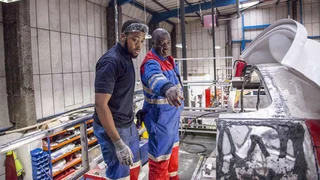
Effective mentorship for engineering apprentices is crucial for fostering talent and ensuring the growth and success of both individuals and companies.
A strong mentor-apprentice relationship can lead to significant professional development for the apprentice, while also contributing to company innovation and productivity. However, only 49% of L&D HR professionals invest in mentoring for apprenticeships!
In this blog, we’ll be providing tops on how to successfully mentor engineering apprentices. By following these tips, mentors can create a supportive and productive environment that nurtures your apprentice's skills and confidence.
1. Building a strong mentor-apprentice relationship
Establishing a strong mentor-apprentice relationship is the cornerstone of successful mentorship. A positive relationship between the two builds trust, encourages open communication, and creates a healthy work environment.
The mentorship component of engineering apprenticeships is one of the most valuable elements, so it’s essential to fully capitalise on it.
Effective communication
Open and honest communication is essential for effective mentorship. It ensures that both mentor and apprentice engineer are on the same page, creating a clear understanding of expectations and goals that both can work towards together.
Active listening involves paying full attention to the apprentice, acknowledging their concerns, and responding thoughtfully. Techniques include nodding, maintaining eye contact, and repeating back what the apprentice has said to ensure understanding.
You can even work together to establish preferred means of communication, such as email or meetings.
When it comes to constructive feedback, it helps apprentices improve their skills and performance, however, it should be specific, actionable, and delivered in a positive manner to encourage growth and learning.
Setting clear expectations
Clearly defined roles and responsibilities help prevent misunderstandings and ensure that both you’ as a mentor’ and your apprentice know what is expected of them, providing a roadmap for your apprentice’s development.
Any goals, aims or milestones should be specific, measurable, achievable, relevant, and time-bound (SMART) so the apprentice knows exactly what they need to achieve, how and when.
It’s also important to check-in regularly with your apprentice. Regular check-ins allow for ongoing feedback and adjustments to the apprentice’s development plan. They help keep the apprentice on track and provide opportunities to address any issues early on.
2. Fostering professional development
Tailoring mentorship
Every apprentice learns differently, so understanding their preferred learning style and interests allows you to tailor your approach, making the mentorship more effective and engaging.
A personalised development plan considers your apprentice’s goals, strengths, and areas for improvement; it provides a structured approach to their development.
If you work with a good apprenticeship provider, they’ll help you tailor your mentorship approach to the needs of the apprentice.
Encouraging continuous learning
Apprentices might already have a lot on their plate with assignments, seminars, and regular work responsibilities. However, clearing an hour or two of their weekly work responsibilities can free up some time to encourage further professional development.
Attending conferences, workshops, and other professional development activities exposes apprentices to new ideas and industry trends. You can even encourage apprentices to gain certifications to enhance their knowledge and skills, making them more valuable to the company.
3. Monitoring progress and providing support
Regular performance reviews
Performance reviews provide formal feedback on an apprentice’s progress. They highlight achievements and areas for improvement, guiding the apprentice’s development.
Every month, you should catch-up with your apprentice about their development and ask if they feel they need further support.
If you need assistance in providing the right guidance and support to your engineering apprentice, Total People is here to help.
Our expert tutors collaborate with employers to deliver top-notch mentorship and training. Contact us today to learn more about how we can support your apprenticeship programme and ensure the success of your apprentices.




